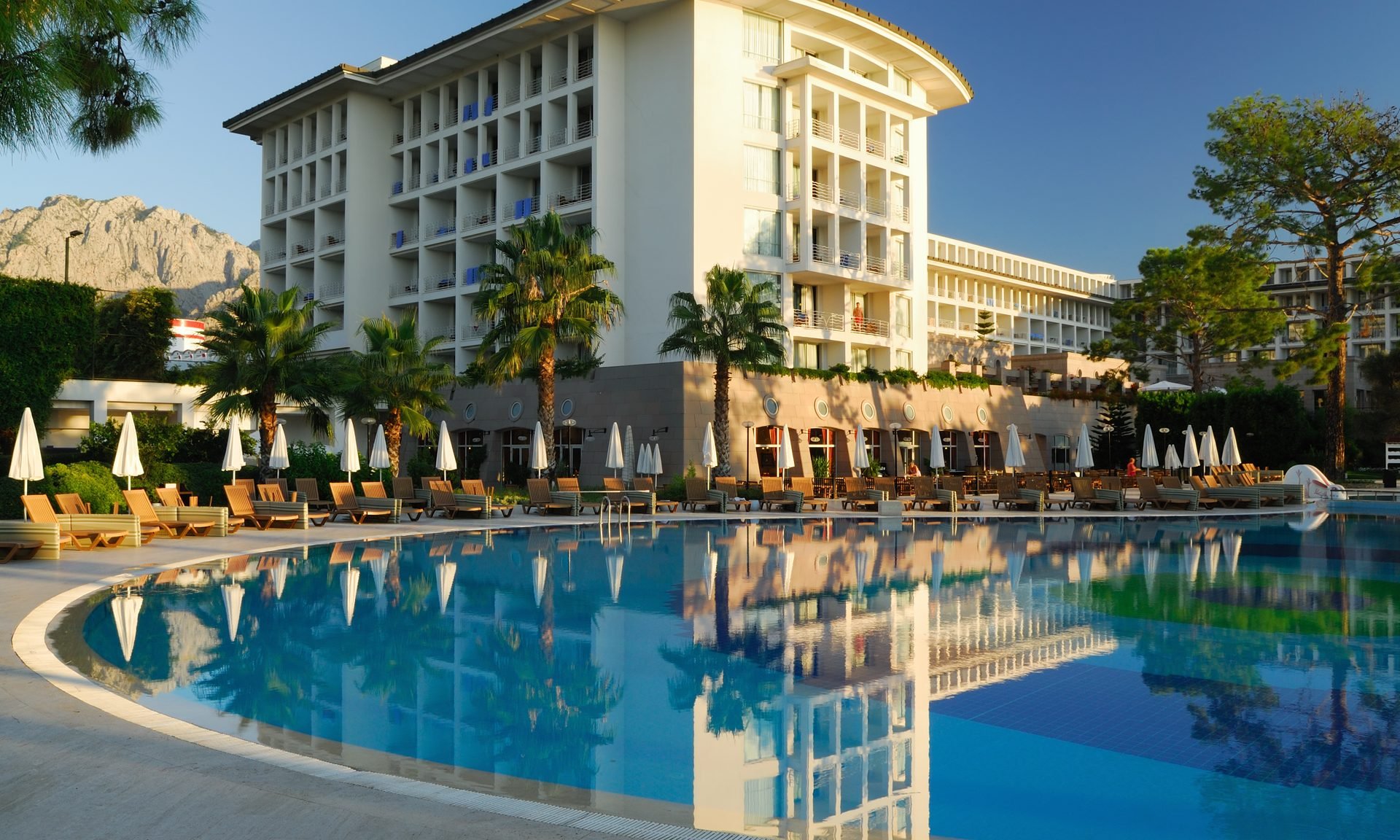How to Avoid Hotel Resort Fees (and Which Brands Are the Worst)
NerdWallet analyzed the major hotel brands to find out which ones have the worst resort fees.

Many or all of the products on this page are from partners who compensate us when you click to or take an action on their website, but this does not influence our evaluations or ratings. Our opinions are our own.
Resort fees are mandatory daily charges that hotels add on top of your base room rate, supposedly to cover amenities like pool access, Wi-Fi, gym usage and other facilities. These fees can range from $15 to $50 per day.
The typical hotel that charges a resort fee is a property with impressive, waterpark-like pools or other top-tier amenities and it’s usually located in popular vacation destinations like Hawaii or Vegas. Many urban properties call these fees something else, like “destination fees” or “amenity fees.”
But resort fees haven't gone away, and some hotels still charge fees that are wildly disproportionate to what guests actually receive. At some properties, the resort fee can actually cost more than the room itself. Plus, travelers who redeem points for a stay may still be on the hook for paying this daily fee.
Here's how much resort fees cost and tips to avoid paying these fees. Plus, we’ve ranked the hotel chains with the highest resort fees.
The average resort fee
NerdWallet analyzed 160 hotels around the world with summer and fall check-in dates. Among the 30 hotels in the analysis that charge resort fees, the average resort fee was $33 per day.
Some hotels also don’t charge a fixed daily rate, but instead charge a percentage of the room rate.
Hotels with the highest and lowest resort fees
NerdWallet collected data on hotels in a variety of destinations, including some cities where resort fees are common, such as Las Vegas and Orlando.
The data, which is part of a broader effort to find the best airline and hotel rewards loyalty programs.
Among hotels that charged resort fees, here were the average resort fees across the major chains:
In our analysis, not a single hotel in the Choice program charged resort fees.
How to find out your hotel’s resort fee
If you are looking online for a hotel in the U.S., you should be able to see resort fees included in the total cost that displays in search results.
Because of new federal regulations that went into effect in 2025, hotels are now required to show the all-in price upfront, rather than tacking on surprise charges at checkout. That's a huge transparency improvement in the U.S., but it might not be the same if you’re traveling abroad.
🤓 Nerdy Tip
NerdWallet’s resort fee analysis is based on averages, and there is no guarantee that a specific hotel will charge a resort fee at all (or that it will be higher than a competitor's nearby). That said, this is a good starting point for finding hotels that offer lower resort fees. You can also try searching the hotel’s website for fees. This is generally a good practice because you might learn about amenities you didn’t know you had access to. For example, the $50 resort fee at Hyatt’s Andaz Maui in Hawaii gets you a lei greeting, free snorkel equipment and GoPro rentals, and free lessons in ukulele, hula, stand-up paddleboarding and coconut husking. There are also free outrigger canoe rides, among other benefits.
How to avoid resort fees
Because resort fees are still part of the required price at hotels that charge them, avoiding them requires strategic booking.
Book resort stays with hotel points (at some chains)
Some hotel chains like Hilton Honors and World of Hyatt waive resort fees on bookings made with points.
Hold elite status (at some brands)
The best hotel elite status programs don’t charge resort fees on award stays or cash stays. Hyatt doesn’t charge such resort fees on either type of stay to its Globalist members, which is the program's highest elite status level. Because Hyatt charges some of the industry's highest fees, this is an especially valuable perk (though realistically, it’s not one that many travelers can reasonably consider).
Use travel statement credits
Some travel credit cards offer statement credits that cover a broad definition of travel. Charge a covered expense to the card (which can often include ferries, buses, campgrounds and extra fees like luggage), and you can get a reimbursement. Typically, resort fees are also reimbursed under the travel statement credits.
Cards that offer travel credits
Annual fee
$795.
$395.
$95.
$0.
Travel credit benefits
$300 annual statement credit for travel purchases.
$300 annual statement credit for spending through Capital One Travel.
$50 annual credit on hotel stays purchased through Chase's travel portal.
Earn 25,000 online bonus points after you make at least $1,000 in purchases in the first 90 days of account opening - that can be a $250 statement credit toward travel purchases.
Still not sure?
Make your case in person
Sometimes asking an employee to waive your fee may do the trick. You cannot simply refuse to pay resort fees, but — just as some hotel employees are occasionally empowered to compensate you — the employee might have authority to remove your resort fee.
Just understand that this is the exception, not the norm. And while it doesn’t hurt to ask, it helps to ask nicely.
Typically, you can make a stronger case if you could not have used the resort amenities (like you checked in late after the gym and pool were closed, and you checked out before they opened).
Get out of paying a hotel’s resort fee
Perhaps the best way to avoid paying hotel resort fees is to not stay at hotels that charge them, period. According to the American Hotel and Lodging Association, about 6% of hotels charge resort fees — a figure that has been declining over the past decade.
Among the hotel chains with top-tier amenities and no resort fees are Drury Hotels and Disney Resort hotels.
And while most hotels in popular tourist destinations still charge fees, you can find some gems.
If resort fees are your big hang-up, you might also find that vacation rentals like Airbnb are more cost-effective than hotels — especially for longer stays or trips with large groups.
At minimum, now that all prices include mandatory fees upfront, you can more easily comparison shop and make informed decisions about whether a hotel's total price — resort fee included — is worth it for your trip.
How to maximize your rewards
You want a travel credit card that prioritizes what’s important to you. Here are some of the best travel credit cards of 2026:
- Flexibility, point transfers and a large bonus: Chase Sapphire Preferred® Card
- No annual fee: Wells Fargo Autograph® Card
- Flat-rate travel rewards: Capital One Venture Rewards Credit Card
- Bonus travel rewards and high-end perks: Chase Sapphire Reserve®
- Luxury perks: American Express Platinum Card®
- Business travelers: Ink Business Preferred® Credit Card
Article sources
NerdWallet writers are subject matter authorities who use primary,
trustworthy sources to inform their work, including peer-reviewed
studies, government websites, academic research and interviews with
industry experts. All content is fact-checked for accuracy, timeliness
and relevance. You can learn more about NerdWallet's high
standards for journalism by reading our
editorial guidelines.
Limited Time Only: Earn $1,000 Toward Travel!
Capital One Venture Rewards Credit Card 
Travel

For a limited time, the
Capital One Venture Rewards Credit Card is offering new cardholders an especially rich bonus: Enjoy $250 to use on Capital One Travel in your first cardholder year, plus earn 75,000 bonus miles once you spend $4,000 on purchases within the first 3 months from account opening - that’s equal to $1,000 in travel!
More like this
Related articles












